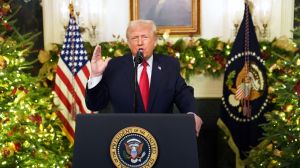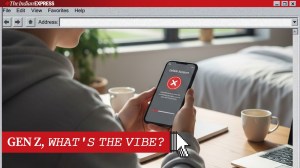From Islamabad, with care
In the coming months, officials in New Delhi and Islamabad will repeatedly refer the media to the 153 words of the joint press statement iss...

In the coming months, officials in New Delhi and Islamabad will repeatedly refer the media to the 153 words of the joint press statement issued in Islamabad on January 6 after nail-biting suspense. I have never seen so many journalists pace up and down the corridors of Islamabad8217;s Holiday Inn, hands in pockets, avoiding eye contact to conceal the embarrassment of being totally clueless as to what the Vajpayee-Musharraf teams were cooking up.
It was a cascading set of issues on which suspense was built up. Will there be an agreement on South Asian free trade? Would Pakistan transcend its psychological hesitations and confer Most Favoured Nation status on India? SAFTA quite elegantly circumvents that. Will there be a Vajpayee-Jamali meeting? Was the request placed with President Musharraf only for a courtesy call? But does a meeting, full delegations in attendance, lasting an hour, still qualify as a 8220;courtesy call8221;?
Since the SAARC and Pakistani briefings were in the basement of the Holiday Inn and Indian briefings on the terrace, it was instructive to see the two styles of disseminating information. When information has to be rationed out to minimise the risk of uninformed speculation, it is useful to have someone in front of the microphones who is in possession of the whole script. External Affairs Minister Yashwant Sinha was sensitive to the presence of a large media delegation and yet not unnecessarily voluble. He would strum a note here, play a passage there to keep the media riveted, while the full musical score was being composed behind the scenes. It would be a goldmine for a journalist or a scholar to lay his hands some day on the countless drafts proposed, corrected, the near deadlocks reached on choice of words. It is in these details that the devil lies.
It was to keep the 8220;devil8221; from getting into the public domain that press briefings became an art in measured communication. Supposing the Pakistani side was digging its heels in on the question of 8220;cross border terrorism8221; and this stance was amplified in the media, public expectations would soar in one direction. Likewise, premature leakage on the way 8220;Kashmir8221; was laced into the draft would have complicated the negotiating process.
It is quite extraordinary how Vajpayee8217;s stature as a statesman has grown in the international arena. Even in quarters in Islamabad generally tardy in giving India credit, Vajpayee8217;s Srinagar speech on April 18 and its spontaneous response by Prime Minister Jamali is seen as the starting point of this entire process. Musharraf also rose to the occasion, despite the hesitations of his bureaucracy. His personal supervision determined the tone of the draft after his meeting with Vajpayee whose concerns on 8220;terrorism8221;, Musharraf grasped, were the key to progress on all issues including Kashmir.
Since January 1, National Security Advisor Brajesh Mishra had been working towards an agreed draft. It was only after the Vajpayee-Musharraf meeting that firm instructions were given out to Pakistani officials to work towards a balanced document.
After praising Vajpayee8217;s 8220;vision, commitment and flexibility8221;, Musharraf at his historic press conference went on to mention the two foreign ministers and Mishra and three of his officials for playing a key role 8212; National Security Adviser Tariq Aziz, Chief of Staff Hamid Javed and Foreign Secretary Riaz Khokar. It is now clear that key negotiations were conducted by Mishra and Aziz, while Javed was drawn in for 8220;critical phrases8221;. Yes, the three paras I referred to at the outset: 8220;Both leaders welcomed the recent steps towards normalisation of relations between the two countries and expressed the hope that the positive trends set by the CBMs would be consolidated8221;.
The PM said that 8220;in order to take forward and sustain the dialogue process violence, hostility and terrorism must be prevented8221;. Musharraf picked up the word 8220;terrorism8221; on which assurances were required from his end. 8220;President Musharraf reassured Prime Minister Vajpayee that he will not permit any territory under Pakistan8217;s control to be used to support terrorism in any manner8221;. This is a historic commitment. While the India specific commitment is total, it also gives Musharraf room to integrate it into the global war against terrorism. He said at his press conference that Pakistani territory will never be allowed 8220;for terrorism anywhere in the world8221;.
8220;President Musharraf emphasised8221;, continues the joint statement,8221;that a sustained and productive dialogue addressing all issues would lead to positive results8221;. The emphasis here and in Vajpayee8217;s phraseology is on a 8220;sustained8221; dialogue 8212; implying a patient process. The third para begins: 8220;To carry the process of normalisation forward8221;, the two 8220;agreed to commence the process of the composite dialogue in February 20048221;. Then comes the crucial reference to Kashmir: 8220;the resumption of the composite dialogue will lead to a peaceful settlement of all bilateral issues, including Jammu and Kashmir, to the satisfaction of both sides8221;. Ending the use of territory under Pakistan8217;s control for terrorism, more CBMs, preliminary contacts to structure the composite dialogue by mid February will obviously proceed almost simultaneously. Composite dialogue, once it gets going, may be guided by the Brajesh Mishra-Tariq Aziz duet.
An important message from Islamabad is Musharraf8217;s response to a reporter8217;s question. 8220;Now that you are turning your back on 56 years of misgivings, can it now be said that friendship with India is part of your strategic doctrine?8221; The president paused, then emphatically: 8220;Of course8221;.
Postscript: As for the mood in Pakistan, consider this full page ad inserted in Dawn during the SAARC Summit supported by Pakistan8217;s Business Forum: 8220;Let us build a South Asian Economic Union8221;.
- 01
- 02
- 03
- 04
- 05































